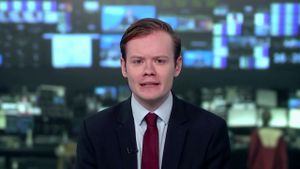With the 2024 U.S. presidential election just around the corner, the unpredictability surrounding who will take the Oval Office is making waves—not just politically, but financially, particularly within the cryptocurrency betting market. Investors are pouring substantial capital, especially focusing on crypto ETFs (exchange-traded funds), anticipating favorable outcomes for pro-crypto candidates, especially with Donald Trump currently viewed as the frontrunner for the Republican nomination.
Leading up to the election, the dynamics of U.S. politics often have significant effects on investor strategies, and the current climate is no different. Analysts from Ryze Labs recently noted, "The rising odds of a Republican sweep have fueled optimism for potential crypto-friendly legislation in Congress post-election." This perspective is pivotal, as many within the crypto investment community believe legislation favorable to their interests could emerge if Trump or another Republican candidate prevails.
Taking this optimism to betting platforms, the prediction market Polymarket has become the focal point for those wanting to stake their bets on the outcome of the election. A notable figure betting on Trump is Théo, a French trader who has placed over $30 million on him winning the 2024 election. Théo, who previously lived and worked as a trader in the U.S., asserted his betting isn't politically motivated but purely financial: "My intent is just making money," he told The Wall Street Journal.
Polymarket has reported more than $2.39 billion wagered on the election, showcasing not only the significant interest but also the trust participants place on market indicators. This high volume raises questions about the market's integrity, as large traders, or "whales," can artificially influence prices with their significant bets.
Théo, for example, saw the betting odds fluctuated with Trump's increasing odds against Kamala Harris, who is likely to represent the Democratic party again. Despite the dynamic nature of predictions, with headlines reporting shifts just before the vote, confidence from large traders adds another layer of complexity. Théo mentioned, "I know many Americans who would vote for Trump without telling you they will," highlighting the uncertain social dynamics surrounding Trump's popularity.
On the other hand, investors and analysts are watching closely, as the substantial bets placed by Théo and others might drastically influence market sentiment leading up to the election. If Trump's predictions turn out correct, speculation about him potentially creating legislation supporting cryptocurrency could significantly boost interest and prices within the sectors.
Adding another layer to this swirling mix of money and politics is the observed volatility surrounding popular Bitcoin ETFs, particularly those tied to major players like BlackRock. Throughout October, BlackRock's IBIT Bitcoin ETF had been leading inflows, contributing nearly $2.2 billion. But cautious investors began pulling back as Friday alone posted $55 million worth of outflows, reflecting the jittery atmosphere of last-minute election shifts and the unpredictable crypto environment. With the election nearing, the outflows were a stark reminder of investor caution amid potential market turbulence.
While Théo and other bettors maintain their positions, uncertainty and speculation dominate the crypto-betting market, mirroring the political climate. Trump supporters remain bullish on the candidate's chances, and big investments signal confidence—or at least the desire to capitalize on perceived trends.
This intersection between politics and the crypto market raises interesting questions for investors and voters alike. How much of the electoral success will hinge on the potential legislative outlook for cryptocurrencies, and vice versa? The volatile nature of markets, especially crypto ones, tends to amplify such intertwining effects.
Back to Polymarket, which does not currently accept wagers from U.S. residents, the platform’s foreign user base still indicates how global traders are engaging with U.S. politics, especially as the dynamics change with fluctuated poll numbers. The validity of these trades and their potential influence on electoral prospects and the crypto market stands alarmingly significant.
Moving forward, the primary takeaway for investors seems to be two-fold: don't just follow individual bets; understand the larger market trends and sentiments they represent. The uncertainty surrounding the election outcome—and its considerable influence on the crypto betting space—will keep investors on their toes, uncertain of whether they're betting on favorable policies or merely hoping for industry-specific gains.
All these developments reflect more than just electoral maneuvering; they symbolize the emergence of cryptocurrency as not only a financial tool but also as part of broader political narratives. Investors, voters, and everyone else observing this dynamic will have to navigate carefully as we march toward November 2024.



